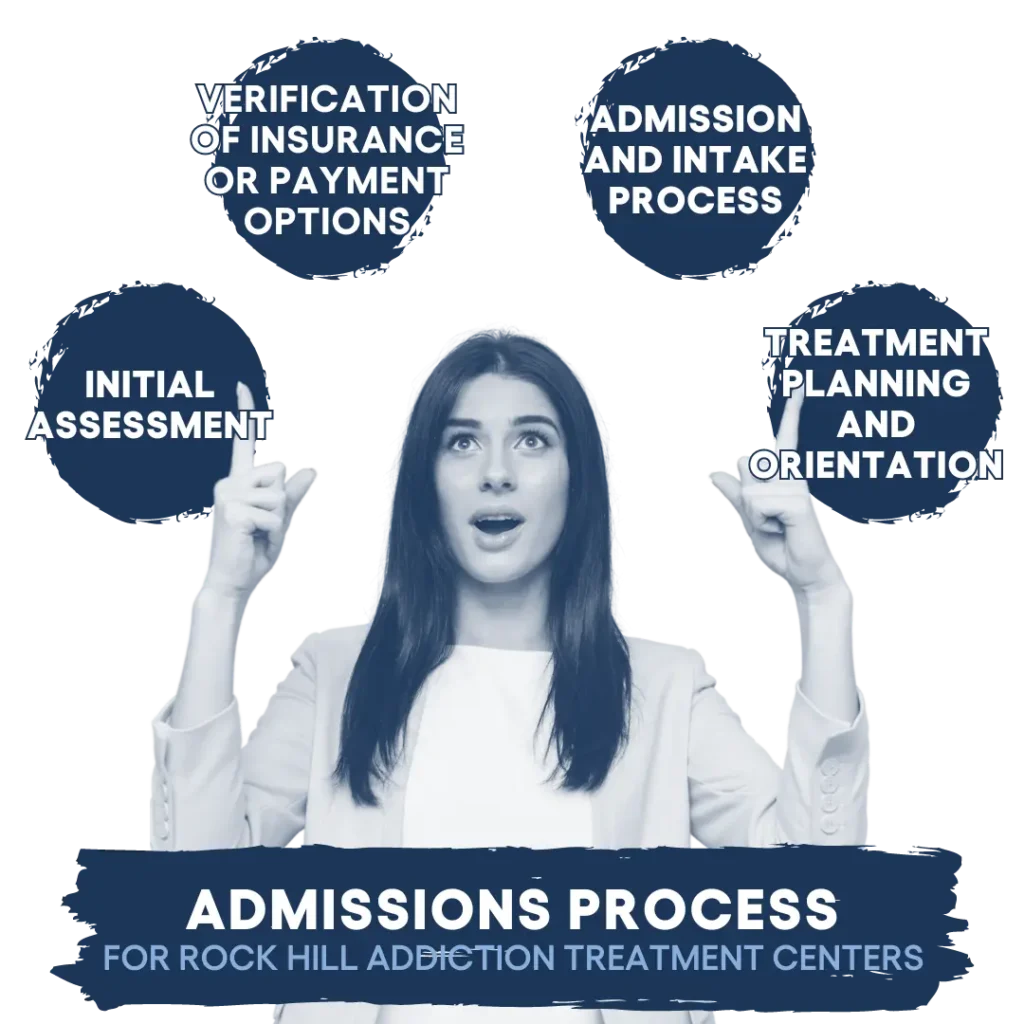If you are in the Rock Hill, SC, area and need help with drug and alcohol addiction – call (704) 248-8561.

Rock Hill, South Carolina, is a vibrant city where nature, culture, and Southern hospitality seamlessly blend. Known for its rich history, scenic Riverwalk along the Catawba River, and educational hub Winthrop University, Rock Hill offers a unique blend of historical significance and modern amenities. Despite its charming appeal, residents of Rock Hill also face challenges with addiction and mental health issues, including mental health disorders and substance abuse.
Rock Hill addiction treatment centers provide a variety of substance abuse treatment options tailored to individual needs. When starting a program for addiction treatment in Rock Hill, SC, you’ll find dedicated teams offering guidance, promoting community-based support, and more, all aimed at helping you on your path to sobriety.
Rock Hill addiction treatment facilities offer a comprehensive array of drug and alcohol treatment services tailored to meet the unique needs of each individual. These personalized programs are designed to help achieve long-term sobriety.
Treatment modalities available in Rock Hill may include:
Inpatient Rehabilitation: Inpatient rehab programs provide intensive, round-the-clock care in a residential setting. Patients stay at the facility for the duration of their treatment, typically ranging from 28 days to several months. Inpatient drug rehab in Rock Hill, SC, offers structured therapy, medical supervision, and support to help individuals detox safely and address underlying issues contributing to their addiction.
Outpatient Treatment: Outpatient programs allow individuals to attend therapy sessions and receive treatment while living at home. This option is suitable for those with less severe addiction or those who have completed inpatient treatment and require ongoing support. Outpatient programs may include individual counseling, group therapy, and medication-assisted treatment.
Medication-Assisted Treatment (MAT): MAT combines medication with counseling and behavioral therapies to treat substance use disorders. Medications such as methadone, buprenorphine, or naltrexone may be prescribed to help manage withdrawal symptoms and cravings, particularly for opioid or alcohol addiction.
Detoxification Programs: Detox programs assist individuals in safely withdrawing from drugs or alcohol under medical supervision. These programs may be offered as part of inpatient or outpatient treatment or as standalone services. Medical professionals monitor patients’ vital signs and provide medications to alleviate withdrawal symptoms.
Individual Therapy: Individual therapy sessions with a trained counselor or therapist can help individuals explore the underlying causes of their addiction, develop coping skills, and set recovery goals. Therapeutic approaches may include cognitive-behavioral therapy (CBT), dialectical behavior therapy (DBT), motivational interviewing, or trauma-informed therapy.
Group Therapy and Support Groups: Group therapy sessions allow individuals to connect with peers who are also in recovery, share experiences, and provide mutual support. Support groups such as Alcoholics Anonymous (AA), Narcotics Anonymous (NA), or SMART Recovery offer ongoing encouragement and accountability.
Family Therapy: Family therapy involves the participation of family members in the treatment process. It aims to improve communication, address dysfunctional dynamics, and strengthen family support networks. Involving loved ones in therapy can enhance the individual’s recovery and promote healthier family relationships.
Holistic Therapies: Holistic approaches to addiction treatment may include activities such as yoga, meditation, art therapy, acupuncture, or equine therapy. These complementary therapies address the physical, emotional, and spiritual aspects of recovery and can help individuals reduce stress, improve self-awareness, and cultivate new coping mechanisms.
When choosing an addiction treatment center in Rock Hill, SC, it's essential to consider several factors to ensure you or your loved one receives comprehensive and effective care.
Here are 10 important things to look for:
Select a facility accredited by reputable organizations such as the Joint Commission or the Commission on Accreditation of Rehabilitation Facilities (CARF). Accreditation ensures the facility meets high standards of quality and safety in addiction treatment.
Assess the treatment approaches offered by the center. Look for evidence-based therapies such as cognitive-behavioral therapy (CBT), dialectical behavior therapy (DBT), motivational interviewing, and medication-assisted treatment (MAT). Ensure the facility provides a personalized treatment plan tailored to your specific needs and preferences.
Confirm that the treatment center employs licensed and experienced healthcare professionals, including addiction counselors, therapists, psychiatrists, nurses, and medical doctors. The staff should have expertise in treating substance use disorders and co-occurring mental health conditions.
If you have a co-occurring mental health disorder such as depression, anxiety, or PTSD, choose a treatment center that offers integrated treatment for dual diagnosis. Addressing both substance abuse and mental health issues simultaneously can improve long-term recovery outcomes.
Opt for a facility that provides a continuum of care, including detoxification services, residential or outpatient treatment, and aftercare planning. A comprehensive treatment program should support individuals through each stage of recovery and offer resources for relapse prevention and ongoing support.
Consider whether the treatment center involves family members in the recovery process through family therapy sessions, educational programs, or family support groups. Family involvement can strengthen relationships, improve communication, and provide essential support for the individual’s recovery journey.
Look for treatment centers that offer holistic and experiential therapies as complementary approaches to traditional counseling. These may include yoga, meditation, art therapy, equine therapy, and recreational activities. Holistic therapies can enhance overall well-being and address underlying emotional and spiritual needs.
Evaluate the location and amenities of the treatment center, considering factors such as proximity to home, accessibility for family visits, and the availability of comfortable accommodations. Facilities with serene environments and recreational amenities can contribute to a healing atmosphere.
Determine the cost of treatment and inquire about insurance coverage and payment options. Many addiction treatment centers accept health insurance plans, Medicaid, or offer sliding scale fees or financing options to make treatment more affordable.
Research the reputation of the treatment center by reading online reviews, testimonials from former clients, and third-party ratings. Positive feedback from individuals who have completed treatment can provide insights into the quality of care and the effectiveness of the program.

Rock Hill provides numerous resources for individuals seeking mental health and addiction treatment. Available options include support groups, counseling services, sober living facilities, vocational training, and legal assistance. Here are a few resources to help you take the next step on your path to sobriety:
NAMI: South Carolina Mental Health Resource Guide – Full list of crisis and support services available in the upstate region.
Southeastern Recovery Center – Full service, holistic therapies for mental health, alcohol, and drug rehab in Greenville, SC.
SAMHSA National Helpline – National helpline for confidential, free help from public health agencies to find more information on local addiction and mental health resources.

Mental health and substance use disorders are critical public health issues in Rock Hill, South Carolina, as they are throughout the country. From 2020 to 2021, South Carolina saw a 25% rise in overdose deaths, increasing from 1,734 to 2,168, with fentanyl implicated in over two-thirds of opioid-related fatalities in 2021.
These statistics help showcase the severe impact of addiction on Rock Hill’s residents and can help inform policy decisions, allocate resources more effectively, and develop community-based strategies to address these challenges.
Congratulations on taking the first step toward sober living! The admissions process for a drug and alcohol rehabilitation center in Rock Hill, SC, may vary depending on the facility, but generally, you can expect the following four steps:

The journey begins with an initial assessment, which may start with a phone call or an in-person meeting with an admissions counselor or intake coordinator. During this assessment, you will be asked about your substance use history, medical background, mental health concerns, and any previous treatment experiences. This information helps determine the most appropriate level of care and treatment plan for you.
Following the initial assessment, the admissions team will assist in verifying your insurance coverage or exploring other payment options. They will work with you to understand your financial situation and determine the best way to cover the cost of treatment. If you have insurance, the team will liaise with your provider to confirm coverage for substance abuse treatment services.
Once financial arrangements are in place, you will proceed with the admission and intake process. This involves completing paperwork, signing consent forms, and providing necessary personal information. The admissions team will also explain what to expect during treatment, including rules and expectations, daily schedules, and available support services.
After completing the admission and intake process, you will meet with a treatment team to develop a personalized treatment plan. This plan will outline your recovery goals and the specific therapies and interventions that will be used to achieve them. Additionally, you will go through an orientation to the rehab facility, including a tour and introductions to staff members and fellow clients.
AA (Alcoholics Anonymous) and NA (Narcotics Anonymous) meetings in Rock Hill offer support for those dealing with alcohol and drug addiction. These meetings create a safe, confidential environment where individuals can share their experiences, challenges, and successes with others who understand the struggles of addiction firsthand.
To find local meetings, call 800-681-2956 – or check out a list below to get started.
To find local meetings (in-person and virtual), click here – or check out the list below.
Exploring sober-friendly activities and events in Rock Hill can make a significant impact on your sobriety journey. Participating in outdoor activities, getting active, appreciating art, and simply relaxing can foster social connections and improve your overall well-being during the recovery process.
Here are some enjoyable activities to do with your family in Rock Hill:

Finding financial resources for addiction and mental health treatment can be challenging. However, there are several options available to help you access necessary care in Rock Hill, SC.
Here’s how you can pay for rehab:
Health Insurance – Many health insurance plans, including private insurance and Medicaid, cover addiction treatment services. Contact your insurance provider to understand your coverage options, such as inpatient or outpatient rehab, detoxification, therapy sessions, and medications.
Medicaid – If you qualify, Medicaid can cover some or all of the costs for addiction treatment, including detox, counseling, and medication-assisted treatment. Check with the South Carolina Department of Health and Human Services or visit healthcare.gov to determine your eligibility and coverage options.
State-Funded Programs – South Carolina offers state-funded addiction treatment programs for those who lack insurance or need financial assistance. These programs may provide low-cost or free services, including detox, residential treatment, outpatient counseling, and support groups. Contact local community health centers or the South Carolina Department of Alcohol and Other Drug Abuse Services (DAODAS) for more information.
Sliding Scale Fees – Some rehab facilities in Rock Hill offer sliding scale fees based on your income and ability to pay. This makes treatment more affordable for individuals with limited resources. Inquire about sliding scale fees when researching treatment centers.
Payment Plans and Financing – Many rehab centers provide payment plans or financing options. You might be able to arrange a monthly payment schedule or secure a loan to cover rehab expenses. Speak with the admissions staff at the treatment center to discuss available payment options.
Employee Assistance Programs (EAP) – If you have an Employee Assistance Program through your employer, it may offer benefits for addiction treatment, including counseling sessions, referrals to rehab facilities, and financial assistance. Contact your human resources department or EAP provider to inquire about available resources.
Grants and Scholarships – Nonprofit organizations and foundations sometimes offer grants or scholarships to those needing addiction treatment. These funds may cover some or all of the rehab costs, depending on eligibility criteria and available funding. Research local charities, nonprofit organizations, or national foundations that support addiction recovery initiatives.
Crowdfunding or Fundraising – Consider seeking financial support from friends, family members, or community members through crowdfunding platforms or fundraising events. Sharing your story and explaining the importance of addiction treatment can inspire others to contribute to your recovery journey.
Rock Hill offers various types of addiction treatment programs, including inpatient rehabilitation, outpatient treatment, medication-assisted treatment (MAT), detoxification programs, individual and group therapy, and holistic therapies. These programs are designed to address different levels of addiction and personal needs.
Payment options for addiction treatment in Rock Hill include health insurance, Medicaid, state-funded programs, sliding scale fees, payment plans, financing options, employee assistance programs, grants, scholarships, and crowdfunding. Contact local treatment centers to discuss specific payment options.
Inpatient rehabilitation provides intensive, round-the-clock care in a residential setting. Patients stay at the facility for the duration of their treatment, which typically ranges from 28 days to several months. Facilities such as the Keystone Substance Abuse Services offer inpatient rehab programs in Rock Hill.
Yes, outpatient treatment programs in Rock Hill allow individuals to attend therapy sessions and receive treatment while living at home. These programs are suitable for those with less severe addiction or those who have completed inpatient treatment. They include individual counseling, group therapy, and medication-assisted treatment.
Yes, Rock Hill has several support groups such as Alcoholics Anonymous (AA) and Narcotics Anonymous (NA). These groups provide a safe and confidential space for individuals to share their experiences, struggles, and triumphs with others who understand the challenges of addiction.
Family involvement is encouraged in many treatment programs in Rock Hill. Family therapy sessions, educational programs, and support groups help improve communication, address dysfunctional dynamics, and strengthen family support networks, enhancing the individual's recovery journey.
Holistic therapies in Rock Hill include activities such as yoga, meditation, art therapy, acupuncture, and equine therapy. These complementary therapies address the physical, emotional, and spiritual aspects of recovery, helping individuals reduce stress, improve self-awareness, and cultivate new coping mechanisms.
